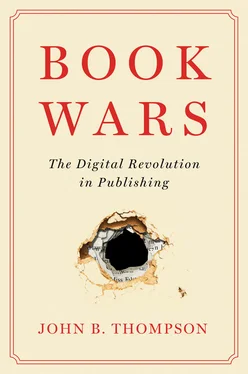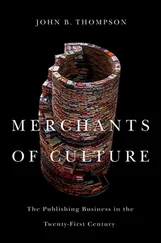My immersion in the messy world of the publishing industry began two decades ago, when I set out to study the structure and transformation of the modern book publishing industry. I spent five years studying the world of academic publishing in the US and the UK, followed by another five years of deep immersion in the world of Anglo-American trade publishing, and I wrote two books about these worlds, Books in the Digital Age (about academic publishing) and Merchants of Culture (about trade publishing). In both of these books, I devoted a lot of attention to the impact of the digital revolution on these two very different sectors of the book publishing industry – this was a key issue in both sectors of this industry from the mid-1990s on, so no serious study of the publishing industry at this time could ignore it. But understanding the impact of the digital revolution was not my sole or even my primary concern in these earlier studies: my primary concern was to understand the key structural characteristics of these sectors – or ‘fields’ as I called them – and to analyse the dynamics that shaped the evolution of these fields over time. When the digital revolution began to make its presence felt in the world of book publishing, it did so by building upon, and in some cases disrupting, a set of institutions, practices and social relations that already existed and were structured in certain ways. Digital technologies and innovations enabled established organizations to do old things in new ways and to do some new things – to improve the efficiency of their organizations; offer better services to authors, readers and clients; repackage their content; develop new products; and, in a myriad of different ways, develop and strengthen their position in the field. But they also enabled new players to enter the field and challenge incumbent stakeholders by offering new products and services. The proliferation of new players and possibilities created a mixture of excitement, alarm and trepidation in the field and generated a profusion of new initiatives, developments and conflicts, as new entrants sought to gain a foothold in a field that had been dominated hitherto by the established players of the publishing industry. Of course, there was nothing new about conflict and change in the publishing industry – the industry had experienced many periods of turbulence and upheaval in the past. But the turbulence generated by the unfolding of the digital revolution in publishing was unprecedented, both in terms of its specific characteristics and in terms of the scale of the challenges it posed. Suddenly, the very foundations of an industry that had existed for more than 500 years were being called into question as never before. The old industry of book publishing was thrust into the limelight as bitter conflicts erupted between publishers and new entrants, including powerful new tech companies who saw the world in very different ways. Skirmishes turned into battles that were fought out in full public view, in some cases ending up in the courts. The book wars had begun.
Books are part of culture and book wars could be seen as culture wars, but they are not the kind of culture war that is normally referred to by this term. The term ‘culture war’ is commonly used to refer to social and political conflicts based on diverging and deeply held values and beliefs, such as those concerning abortion, affirmative action, sexual orientation, religion, morality and family life. These are conflicts rooted in values and value systems to which many people are deeply attached. They tap into identities as well as interests, into different senses of who we are as individuals and collectivities and of what does and should matter to us – hence the passion with which these culture wars have so often been fought in the public domain. The book wars are a very different kind of conflict. They don’t arouse the passions as the culture wars do, no one has marched in the streets or burned books in protest. By the standards of the culture wars, the book wars are distinctly low-key. Indeed, ‘book wars’ might seem like a rather dramatic term for a state of affairs that involves no overt displays of violence, no demonstrations and no shouting in the streets. But the absence of overt displays of violence should not mislead us into thinking that the conflicts are not real or that they don’t really matter. On the contrary, the struggles that have broken out over the last couple of decades in the normally placid world of publishing are very real; they have been fought with a determination and conviction that attests to the fact that, for those involved, these are hugely important struggles that touch on vital interests and in which matters of principle are at stake. At the same time, they are symptoms of the fact that the book industry is undergoing a profound transformation which is disrupting the field, calling into question accepted ways of doing things and thrusting established players into conflict both with new entrants and with old hands who have spotted new opportunities opened up by technological change and seized them, sometimes at the expense of others.
My aim in this book is to examine what actually happened, and what continues to happen, when the digital revolution takes hold in the world of book publishing. Not surprisingly, this is a complicated story with many different players and developments, as established organizations sought to defend and advance their positions while many new players sought to enter the field, or to experiment with new ways of creating and disseminating what we have come to think of as ‘the book’. Given that the world of book publishing is itself immensely complex, consisting of many different worlds with their own players and practices, I have not tried to be comprehensive: I have reduced the complexity and narrowed the scope by focusing on the world of Anglo-American trade publishing – the same world that was the focus of Merchants of Culture . By ‘trade publishing’, I mean that sector of the industry that publishes books, both fiction and nonfiction, that are aimed at general readers and sold through bookstores like Barnes & Noble, Waterstones and other retail outlets, including online booksellers like Amazon. By ‘Anglo-American’ trade publishing, I mean English-language trade publishing that is based in the US and the UK, and for various historical reasons the publishing industries based in the US and the UK have long had a dominant role in the international field of English-language trade publishing. To understand the impact of the digital revolution on other sectors of publishing, such as academic publishing or reference publishing, or on publishing industries operating in other languages and other countries, would require different studies, as the processes and players would not be the same. While my focus here is on the world of Anglo-American trade publishing, I have not restricted myself to the traditional players in this field. The traditional players are important – no question about it. But a key part of the disruption caused by the digital revolution is that it is a shake-up that opens the door for other players to enter the field. These include some of the large tech companies with their own agendas and their own battles to fight, equipped with resources on a scale that dwarfs even the largest of the traditional publishers. But they also include a myriad of small players and enterprising individuals who are located on the margins of the field or in separate spaces altogether, in some cases impinging directly on the publishing field and in other cases subsisting in a parallel universe that connects only indirectly, if at all, with what we might think of as the world of the book.
While some of these new players and their initiatives gain real traction and develop into substantial undertakings, others fizzle out and die – the history of technology is littered with inventions that fail. But when historians come to write the history of technologies and of the companies that develop them, they tend to focus on the successful ones, on the technologies and organizations that, in some sense or some respect, change the world. We read history backwards through the lens of the inventions and companies that succeed. We are fascinated by the Googles and Apples and Facebooks and Amazons of this world – those exceptional ‘unicorns’ that have become so large so quickly that they have assumed an almost mythical status. What gets filtered out of this process are all of those inventions, initiatives and new ideas that seemed like good ideas at the time, maybe even great ideas in which some people passionately believed, but that, for one reason or another, didn’t make it – all those small histories of the great ideas that failed. Maybe the time wasn’t right, maybe the money ran out, maybe it wasn’t such a good idea after all – whatever the reason, the vast majority of new ventures fail. But the history of the new ventures that failed is often just as revealing as the history of those that succeeded. The failures and false starts tell us a lot about the conditions of success precisely because they underscore what happens when those conditions, or some of those conditions, are absent. And if the vast majority of new ventures end in failure, then an account that focused only on the successes would be very partial at best. Writing the history of technologies by focusing only on the successes would be as one-sided and misleading as writing the history of wars from the perspective of the victors.
Читать дальше












